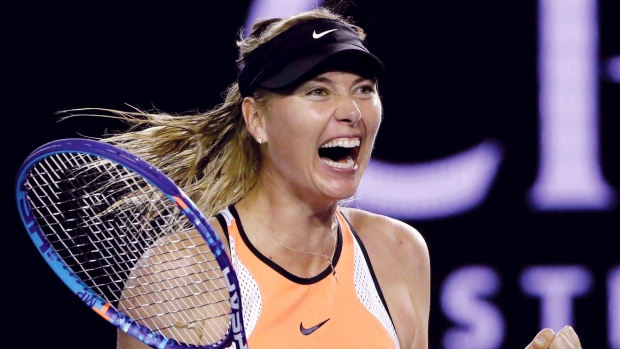Apr 21, 2017
Sharapova could be eligible to play French Open
Maria Sharapova will find out the week starting May 15 if she can compete at the French Open, which starts two weeks later, the French Tennis Federation said.
The Canadian Press

PARIS — Maria Sharapova will find out the week starting May 15 if she can compete at the French Open, which starts two weeks later, the French Tennis Federation said.
The five-time Grand Slam winner and former world No. 1 returns to competition next week as a wild card in Stuttgart's Porsche Tennis Grand Prix.
The Russian was suspended after testing positive for heart drug meldonium at the 2016 Australian Open. The ban was reduced from two years to 15 months last October by the Court of Arbitration for Sport. Meldonium, which was previously legal, was banned by the World Anti-Doping Agency earlier that year, but Sharapova claims she missed the memo instructing her to stop using it.
Her suspension ends on the third day of the Stuttgart tournament, meaning she won't be allowed even to play before Wednesday.
Top-ranked players Angelique Kerber and Andy Murray are among those who have questioned whether Sharapova should be allowed to resume her career in main draws without playing her way back through qualifiers. Sharapova has also been handed a wild card into the Italian Open in Rome next month.
Now the French Open and possibly Wimbledon must decide whether to give an entry to Sharapova, a former champion of both Grand Slams.
The FFT said in an email response to The Associated Press that "the decision will be taken the week of (Monday) May 15," without giving further details.
Sharapova, who has titles at all four majors, won at Roland Garros in 2012 and 2014.
The 30-year-old Sharapova was among more than 100 athletes who tested positive after meldonium was banned in sport last year.
Most of those were cleared because of evidence they stopped taking meldonium before it was banned, though Sharapova was suspended because she took it after the cutoff date.
Numerous claims have been made over recent decades about meldonium, which is marketed for sufferers from heart and circulatory conditions, including that it can increase physical and mental endurance.
However, Russian officials have said it is not performance-enhancing for sports, arguing it prevents heart attacks under extreme stress.
Sharapova said last year she used it for 10 years for reasons including a magnesium deficiency, irregular heart test results, and a family history of diabetes.
